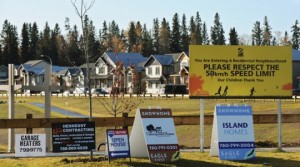(ThyBlackMan.com) Whether it’s due to the clean air, good healthcare, or low crime, a significant number of people are choosing to live in Canada. However, there’s quite a lot of territory up there; like deciding where one should reside in the States, more than a few things need consideration. Use the following to make better informed decision on where to move in Canada.
Calgary
Calgary rests in the foothills of the Rockies and offers residents plenty of mountainous and riverway views. Economic folks choose the province of Alberta due to its tax rates, the lowest in the country. Those seeking jobs in oil, gas, or agricultural industries find steady work and affordable housing.
Those looking for long, hot summers need to look elsewhere. Though the climate is dry and humid, the winters are long and cold. Yet, the city is among the sunniest in the region, with an average of 330 days of sunny rays per year despite many of them featuring snowfall. The city offers a wealth of entertainment, and public transit is convenient with a choice of buses, shuttles, and light rails. As long as you get off the light rail before leaving downtown, the fare is free.
Delta
The largest municipality of the Greater Vancouver Regional District, “Delta” is located at the delta of the Fraser River, making it one of the most important agricultural destinations in Vancouver. Known for its sprawling neighborhoods surrounded by nature that are incredibly safe, nature lovers gravitate to the area to raise families. Parks, trails, and wildlife make Delta a peaceful place for those who appreciate the outdoors.
Delta hosts some of the mildest climates in Canada, getting very little snowfall. The summers are sunny and warm yet free of humidity and extreme heat. Whereas many regions quickly change from winter to summer, Delta has a palpable spring and autumn season.
Delta is interconnected with other major destinations, and transportation fares depend on the number of zones crossed. Frequent travelers save money with prepaid tickets, with weekends and holidays allowing goers to travel anywhere with a one-zone fare.
Edmonton
The capital of Alberta is the second largest city of the province (by population). It has the fastest growing economy among the larger cities in Canada and the fourth-largest GDP. Those seeking job opportunities flock to the area for its low taxes and an abundance of homes for sale. Dry climate, low precipitation, and over 2,000 hours of sun per year contrast with winters that get extremely cold. Expect a significant amount of snow on the ground for half the year.
The Edmonton Transit System operates the light rail and local buses, with rails headed Northeast, Downtown, Government Centre, University, and to the South areas. Buses do not go to some remote suburbs or industrial areas and do not run on Sundays.
Fort McMurray
Fort McMurray resides in Northern Canada, atop the largest oil sand deposit in the world. Championed for its culture, the region draws settlers from all over the world. About 2,000 of its 72,000 residents are non-permanent. The older portion of the city, deemed the “Hill” contrasts with the newer, high-class residential section north of the Athabasca River.
The town is the heart of Canada’s oil production, with the economy dependent on natural gas and oil pipelines, forestry, and tourism. If you’re planning to invest in Canadian real estate then checkout Precondo. Experts project the oil sands will fuel Canada’s economy for the next two to three decades. Due to the region’s boom, housing prices are much higher than one would expect within a rural and remote town.
Staff Writer; Tom Love

















Leave a Reply